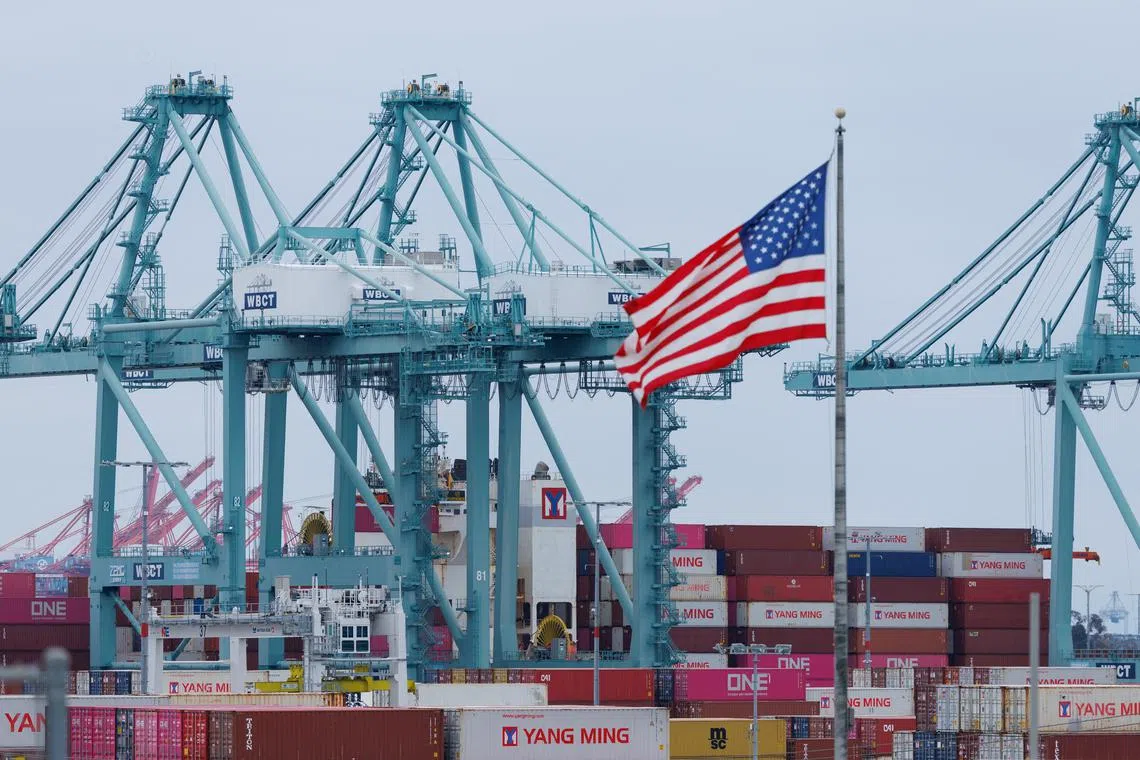US Supreme Court to decide on legality of Trump’s tariffs
Sign up now: Get ST's newsletters delivered to your inbox

The court placed the case on a fast track, scheduling oral arguments for the first week of November.
PHOTO: REUTERS
WASHINGTON – The US Supreme Court agreed on Sept 9 to decide on the legality of Mr Donald Trump’s sweeping global tariffs, setting up a major test of one of the Republican President’s boldest assertions of executive power that has been central to his economic and trade agenda.
The justices took up the Justice Department’s appeal of a lower court’s ruling that Mr Trump overstepped his authority in imposing most of his tariffs under a federal law meant for emergencies.
The court swiftly acted after the administration last week asked it to review the case, which implicates trillions of dollars in customs duties over the next decade.
The court, which begins its next nine-month term on Oct 6, placed the case on a fast track, scheduling oral arguments for the first week of November.
The US Court of Appeals for the Federal Circuit in Washington ruled on Aug 29 that Mr Trump had overreached in invoking a 1977 law
The appeals court ruling stems from two challenges. One was brought by five small businesses that import goods, including a New York wine and spirits importer and a Pennsylvania-based sport fishing retailer.
The other was filed by 12 US states – Arizona, Colorado, Connecticut, Delaware, Illinois, Maine, Minnesota, Nevada, New Mexico, New York, Oregon and Vermont – most of them governed by Democrats.
The Supreme Court also agreed to hear a separate challenge to Mr Trump’s tariffs brought by a family-owned toy company, Learning Resources.
The tariffs are part of a global trade war instigated by Mr Trump
Mr Trump has made tariffs a key foreign policy tool, using them to renegotiate trade deals, extract concessions and exert political pressure on other countries.
The President in April invoked the 1977 law in imposing tariffs on goods imported from individual countries to address trade deficits, as well as separate tariffs announced in February as economic leverage on China, Canada and Mexico to curb the trafficking of fentanyl and illicit drugs into the US.
The law gives the US president power to deal with “an unusual and extraordinary threat” amid a national emergency.
It historically had been used for imposing sanctions on enemies or freezing their assets. Prior to Mr Trump, the law had never been used to impose tariffs.
Mr Jeffrey Schwab, a lawyer with the Liberty Justice Centre legal group representing small business challengers to Mr Trump’s tariffs, said he is confident that the Supreme Court will recognise that the president does not have unilateral tariff power under this law.
“Congress, not the president alone, has the constitutional power to impose tariffs,” Mr Schwab said.
‘Economic catastrophe’
Mr Trump’s Justice Department has argued that the law allows tariffs under emergency provisions that authorise a president to “regulate” imports.
Denying Mr Trump’s tariff power “would expose our nation to trade retaliation without effective defences and thrust America back to the brink of economic catastrophe”, it said.
Mr Trump has said that if he loses the case, the US might have to unwind trade deals, causing the country to “suffer so greatly”.
The non-partisan Congressional Budget Office reported in August that the increased duties on imports from foreign countries could reduce the US national deficit by US$4 trillion (S$5.13 trillion) over the next decade.
The US Constitution grants Congress, not the president, the authority to issue taxes and tariffs, and any delegation of that authority must be both explicit and limited, according to the lawsuits.
The Federal Circuit agreed. “It seems unlikely that Congress intended, in enacting IEEPA, to depart from its past practice and grant the president unlimited authority to impose tariffs,” it said in a 7-4 decision.
The appeals court also said that the administration’s expansive view of this law violates the Supreme Court’s “major questions” doctrine, which requires executive branch actions of vast economic and political significance to be clearly authorised by Congress.
The New York-based US Court of International Trade, which has jurisdiction over customs and trade disputes, previously ruled against Mr Trump’s tariff policies on May 28.
Another court in Washington ruled that the law does not authorise Mr Trump’s tariffs, and the administration has appealed that decision as well.
At least eight lawsuits have challenged Mr Trump’s tariff policies, including one filed by the state of California.
Mr Tim Brightbill, an expert in international trade law at the Wiley Rein law firm, said it was important for the Supreme Court to weigh in as quickly as possible given that it is an “extremely important question involving billions of dollars – potentially trillions of dollars”.
Mr Brightbill said that only a handful of trade law cases have gone to the Supreme Court, “so it just shows the extreme importance of this issue across the US economy, and really the global economy”. REUTERS


